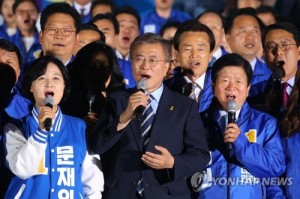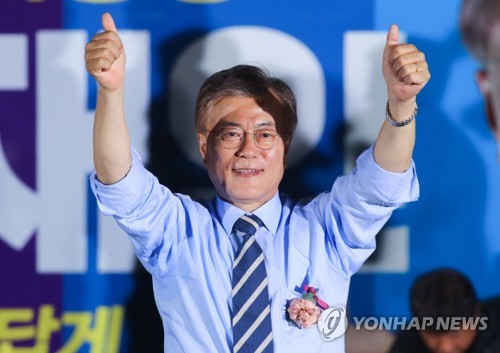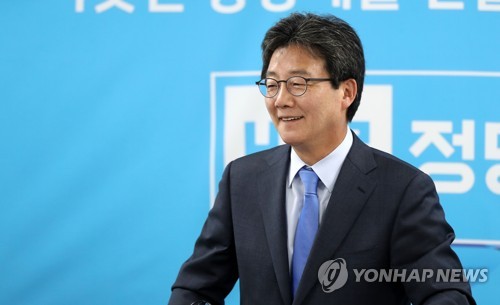- California Assembly OKs highest minimum wage in nation
- S. Korea unveils first graphic cigarette warnings
- US joins with South Korea, Japan in bid to deter North Korea
- LPGA golfer Chun In-gee finally back in action
- S. Korea won’t be top seed in final World Cup qualification round
- US men’s soccer misses 2nd straight Olympics
- US back on track in qualifying with 4-0 win over Guatemala
- High-intensity workout injuries spawn cottage industry
- CDC expands range of Zika mosquitoes into parts of Northeast
- Who knew? ‘The Walking Dead’ is helping families connect
After 10 years, liberals return to power
SEOUL, May 10 (Yonhap) — Moon Jae-in’s election as South Korea’s next president will mark the return of political liberals to power after 10 years of conservative rule, presaging a broad policy shift and reshaping of the political landscape.

This photo, taken on May 8, 2017, shows Moon Jae-in (C), the then-presidential candidate of the liberal Democratic Party, and his party colleagues singing the national anthem during his election campaign in Seoul. (Yonhap)
Moon Jae-in, the former human rights lawyer and opposition leader, was sure to win the election held on Tuesday riding on the public discontent with corruption-tainted former leader Park Geun-hye and aspirations for the recovery of democracy trampled on by the rotten political and business elites.
Moon has vowed drastic policy changes from engagement with North Korea to curbs on family-owned conglomerates, from a tougher corruption fight to subsidized youth jobs. He pledged an inclusive, sustainable growth backed by broad-based income and a greater government role in reinforcing market efficiency and fairness.
But the post-election euphoria may fade soon in the face of tough realities facing the new leader, experts said. The nation’s recovery is still fragile, fiscal deficits limit government leeway, and the parliament is controlled by opposition parties. The nation is squeezed in geopolitical tensions and diplomatic chasms with world powers.
All these raise doubts about whether the liberals can effectively translate their newfound power into substantive policy changes.
“The failures of the preceding governments have naturally allowed Moon and his liberal colleagues to retake power in this election dominated by voters’ vociferous calls for judgment on conservatives,” Jun Kye-wan, a political analyst, told Yonhap News Agency.
“But liberals can’t afford to just bask in the euphoria as they have to clearly prove that they are way better than conservatives in terms of formulating and implementing policies to tackle social, political and economic issues left unresolved by the conservative governments,” he added.
After a grueling, highly divisive campaign, any policy excess and misstep would face tougher scrutiny and resistance from conservatives, which limits the new leader’s space for policy initiatives and warrants closer cooperation with opposition parties, they said.
In the wake of their defeat, fractured conservatives are expected to regroup based on new visions, and intensify efforts to win back voter support ahead of next year’s gubernatorial and mayoral elections seen as a referendum on the new government’s performance.
Moon’s victory is clearly a manifestation of prevalent repugnance against the scandal involving Park and her cohorts. Yet it also resulted from voter disappointment with her government’s failures to defend their much-vaunted values of growth, fair competition and robust national security.
During the liberal Kim Dae-jung and Roh Moo-hyun administrations from 1998-2007, the country posted an average annual growth of around 4.9 percent. Under the conservative Lee Myung-bak and Park Geun-hye governments from 2008-2016, growth averaged 2.8 percent, largely due to the global financial crisis.
The Park scandal laid bare deep-seated corruptive ties between those with political and economic power, which critics claim have distorted market competition and denied smaller firms fair opportunities.
Over the past decade, the security environment has gotten worse with Pyongyang’s relentless pursuit of nuclear arms and longer-range missiles, which resulted in a sharp decrease in cross-border dialogue, economic exchanges and cooperation.
 This photo, taken on May 8, 2017, shows Moon Jae-in, the then-presidential candidate of the liberal Democratic Party, giving a thumbs-up during his election campaign in Seoul. (Yonhap)
This photo, taken on May 8, 2017, shows Moon Jae-in, the then-presidential candidate of the liberal Democratic Party, giving a thumbs-up during his election campaign in Seoul. (Yonhap)
“The biggest cause (for the decline of conservatives) is that they have failed to promote their shared values, such as growth and strong defense, though they had much ballyhooed them,” said Kim Hyung-joon, a professor of political science at Myongji University.
The new liberal government is expected to pursue a substantial policy shift in terms of inter-Korean relations, taxation, wealth distribution and the relations with its ally the United States, among others.
While the conservative governments refrained from providing unconditional largess to Pyongyang with a focus on strict reciprocity, the Moon administration is expected to exercise more flexibility in pursuing dialogue and exchanges with the communist regime.
The security alliance with Washington could undergo adjustments as the new government is likely to pursue a “more balanced, fairer” bilateral relationship, strengthen independent military capabilities and retake wartime operational control at an early date.
The new government is also poised to collect more taxes from top businesses and income earners to address the widening gap between the haves and have-nots, and enhance welfare programs for the socially vulnerable.
But such key policy changes are expected to go through tougher parliamentary scrutiny as the opposition leads the 299-seat National Assembly. Moon’s Democratic Party is the largest force in parliament but holds only 119 seats.
“Though liberals grabbed power, abrupt policy U-turns may not be easy without close communication or coordination with conservatives and other political forces given the current political configuration,” said Ko Sung-kook, a political analyst.
 This photo, taken on May 7, 2017, shows Yoo Seong-min, the then-presidential candidate of the splinter conservative Bareun Party, speaking during a press conference in Daegu, 302 kilometers southeast of Seoul. (Yonhap)
This photo, taken on May 7, 2017, shows Yoo Seong-min, the then-presidential candidate of the splinter conservative Bareun Party, speaking during a press conference in Daegu, 302 kilometers southeast of Seoul. (Yonhap)
Moon and the mainstream in the Democratic Party are not free from the legacy of the Roh administration, which has been criticized for failure to revive the economy, and worsening political and ideological divisions. Moon served as Roh’s chief of staff.
During the campaign, Moon said he would inherit both the faults and achievements of the Roh government. He also vowed to create a “unity” government with diverse political forces.
“Moon’s pledge to establish a ‘unity’ government embracing both liberals and moderate conservatives actually reflects the political reality facing the new administration,” he added.
Lee Jun-han, a professor of political science at Incheon National University, warned that a failure to ensure smooth coordination with opposition parties could blunt the momentum for the new government to push for new policy initiatives.
“In the process of formulating and enforcing new polices, it is important to smoothly reconcile differences (with opposition forces). Or else, the new government could face severe division in public opinion,” he pointed out.
The defeat of the election is expected to further galvanize conservatives’ reform efforts. Over the past months, they have been struggling to refurbish their image tarnished by the scandal-hit former president.
In particular, Yoo Seong-min, the former presidential nominee of the splinter Bareun Party, and his party colleagues have vowed to create “transparent, warm” conservatism, but their efforts have faltered amid crippling disunity within the conservative bloc.
“Conservatives have not yet been in any sincere soul-searching mode, which only makes voters frown and makes their revival even more elusive,” said Lee Chung-hee, politics professor at the Hankuk University of Foreign Studies.
“They have to present new leitmotifs and visions to the public to find any momentum for their political comeback,” he added.












![일본 사도광산 [서경덕 교수 제공. 재판매 및 DB 금지]](http://www.koreatimesus.com/wp-content/uploads/2024/07/PYH2024072610800050400_P4-copy-120x134.jpg)



icloud download
May 9, 2017 at 9:40 PM
You can take a backup of all your photos, documents, apps, music and other things. With iCloud
icloud download
June 1, 2017 at 4:21 AM
iCloud is a cloud-storage service from the popular brand Apple. Everything that the user wants to store can be easily stored on an external hard disk in the sky, popularly known as the iCloud drive.
icloud backup
June 6, 2017 at 6:26 AM
icloud backup
How to Make Google My Homepage
July 15, 2017 at 6:10 AM
How to Make Google My Homepage
icloud login
November 18, 2017 at 4:12 AM
icloud login